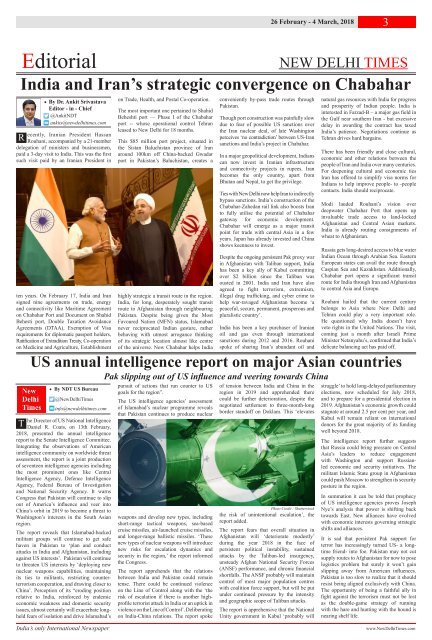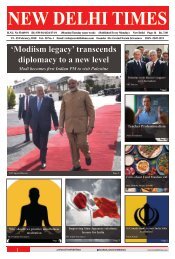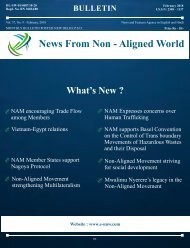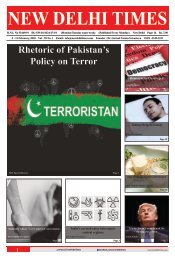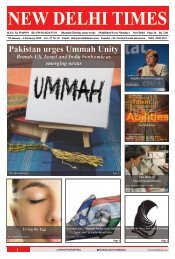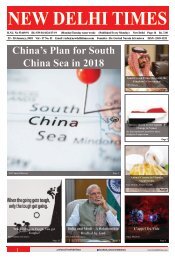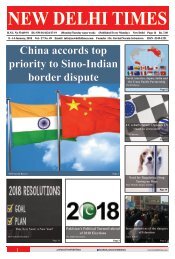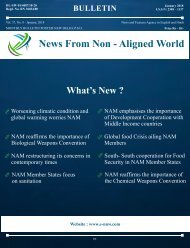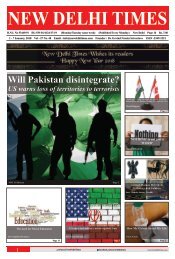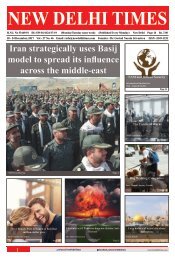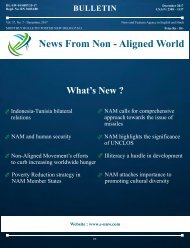26 February - 4 March 2018 - 16-new-min
Create successful ePaper yourself
Turn your PDF publications into a flip-book with our unique Google optimized e-Paper software.
<strong>26</strong> <strong>February</strong> - 4 <strong>March</strong>, <strong>2018</strong> 3<br />
Editorial<br />
NEW DELHI TIMES<br />
India and Iran’s strategic convergence on Chabahar<br />
R<br />
T<br />
◆◆<br />
By Dr. Ankit Srivastava<br />
Editor - in - Chief<br />
@AnkitNDT<br />
ankits@<strong>new</strong>delhitimes.com<br />
ecently, Iranian President Hassan<br />
Rouhani, accompanied by a 21-member<br />
delegation of <strong>min</strong>isters and businessmen,<br />
paid a 3-day visit to India. This was the first<br />
such visit paid by an Iranian President in<br />
ten years. On <strong>February</strong> 17, India and Iran<br />
signed nine agreements on trade, energy<br />
and connectivity like Maritime Agreement<br />
on Chabahar Port and Document on Shahid<br />
Behesti port, Double Taxation Avoidance<br />
Agreements (DTAA), Exemption of Visa<br />
requirements for diplomatic passport holders,<br />
Ratification of Extradition Treaty, Co-operation<br />
on Medicine and Agriculture, Establishment<br />
US annual intelligence report on major Asian countries<br />
◆◆<br />
By NDT US Bureau<br />
@NewDelhiTimes<br />
info@<strong>new</strong>delhitimes.com<br />
he Director of US National Intelligence<br />
Daniel R. Coats, on 13th <strong>February</strong>,<br />
<strong>2018</strong>, presented the annual intelligence<br />
report to the Senate Intelligence Committee.<br />
Integrating the observations of American<br />
intelligence community on worldwide threat<br />
assessment, the report is a joint production<br />
of seventeen intelligence agencies including<br />
the most pro<strong>min</strong>ent ones like Central<br />
Intelligence Agency, Defence Intelligence<br />
Agency, Federal Bureau of Investigation<br />
and National Security Agency. It warns<br />
Congress that Pakistan will continue to slip<br />
out of America’s influence and veer into<br />
China’s orbit in 2019 to become a threat to<br />
Washington’s interests in the South Asian<br />
region.<br />
The report reveals that Islamabad-backed<br />
militant groups will continue to get safe<br />
haven in Pakistan to ‘plan and conduct<br />
attacks in India and Afghanistan, including<br />
against US interests’. Pakistan will continue<br />
to threaten US interests by ‘deploying <strong>new</strong><br />
nuclear weapons capabilities, maintaining<br />
its ties to militants, restricting counterterrorism<br />
cooperation, and drawing closer to<br />
China’. Perception of its “eroding position<br />
relative to India, reinforced by endemic<br />
economic weakness and domestic security<br />
issues, almost certainly will exacerbate longheld<br />
fears of isolation and drive Islamabad’s<br />
on Trade, Health, and Postal Co-operation.<br />
The most important one pertained to Shahid<br />
Beheshti port — Phase I of the Chabahar<br />
port -- whose operational control Tehran<br />
leased to New Delhi for 18 months.<br />
This $85 million port project, situated in<br />
the Sistan Baluchistan province of Iran<br />
around 100km off China-backed Gwadar<br />
port in Pakistan’s Baluchistan, creates a<br />
highly strategic a transit route in the region.<br />
India, for long, desperately sought transit<br />
route to Afghanistan through neighbouring<br />
Pakistan. Despite being given the Most<br />
Favoured Nation (MFN) status, Islamabad<br />
never reciprocated Indian gesture, rather<br />
behaving with utmost arrogance thinking<br />
of its strategic location almost like centre<br />
of the universe. Now Chabahar helps India<br />
Pak slipping out of US influence and veering towards China<br />
pursuit of actions that run counter to US<br />
goals for the region”.<br />
The US intelligence agencies’ assessment<br />
of Islamabad’s nuclear programme reveals<br />
that Pakistan continues to produce nuclear<br />
weapons and develop <strong>new</strong> types, including<br />
short-range tactical weapons, sea-based<br />
cruise missiles, air-launched cruise missiles,<br />
and longer-range ballistic missiles. ‘These<br />
<strong>new</strong> types of nuclear weapons will introduce<br />
<strong>new</strong> risks for escalation dynamics and<br />
security in the region,’ the report informed<br />
the Congress.<br />
The report apprehends that the relations<br />
between India and Pakistan could remain<br />
tense. There could be continued violence<br />
on the Line of Control along with the ‘the<br />
risk of escalation if there is another highprofile<br />
terrorist attack in India or an uptick in<br />
violence on the Line of Control’. Deliberating<br />
on India-China relations. The report spoke<br />
conveniently by-pass trade routes through<br />
Pakistan.<br />
Though port construction was painfully slow<br />
due to fear of possible US sanctions over<br />
the Iran nuclear deal, of late Washington<br />
perceives ‘no contradiction’ between US-Iran<br />
sanctions and India’s project in Chabahar.<br />
In a major geopolitical development, Indians<br />
can now invest in Iranian infrastructure<br />
and connectivity projects in rupees. Iran<br />
becomes the only country, apart from<br />
Bhutan and Nepal, to get the privilege.<br />
Ties with New Delhi now help Iran to indirectly<br />
bypass sanctions. India’s construction of the<br />
Chabahar-Zahedan rail link also boosts Iran<br />
to fully utilise the potential of Chabahar<br />
gateway for economic development.<br />
Chabahar will emerge as a major transit<br />
point for trade with central Asia in a few<br />
years. Japan has already invested and China<br />
shows keenness to invest.<br />
Despite the ongoing persistent Pak proxy war<br />
in Afghanistan with Taliban support, India<br />
has been a key ally of Kabul committing<br />
over $2 billion since the Taliban was<br />
ousted in 2001. India and Iran have also<br />
agreed to fight terrorism, extremism,<br />
illegal drug trafficking, and cyber crime to<br />
help war-ravaged Afghanistan become ‘a<br />
peaceful, secure, permanent, prosperous and<br />
pluralistic country’.<br />
India has been a key purchaser of Iranian<br />
oil and gas even through international<br />
sanctions during 2012 and 20<strong>16</strong>. Rouhani<br />
spoke of sharing Iran’s abundant oil and<br />
of tension between India and China in the<br />
region in 2019 and apprehended there<br />
could be further deterioration, despite the<br />
negotiated settlement to three-month-long<br />
border standoff on Doklam. This ‘elevates<br />
Photo Credit : Shutterstock<br />
the risk of unintentional escalation’, the<br />
report added.<br />
The report fears that overall situation in<br />
Afghanistan will ‘deteriorate modestly’<br />
during the year <strong>2018</strong> in the face of<br />
persistent political instability, sustained<br />
attacks by the Taliban-led insurgency,<br />
unsteady Afghan National Security Forces<br />
(ANSF) performance, and chronic financial<br />
shortfalls. The ANSF probably will maintain<br />
control of most major population centres<br />
with coalition force support, but will be put<br />
under continued pressure by the intensity<br />
and geographic scope of Taliban attacks.<br />
The report is apprehensive that the National<br />
Unity government in Kabul ‘probably will<br />
natural gas resources with India for progress<br />
and prosperity of Indian people. India is<br />
interested in Farzad-B – a major gas field in<br />
the Gulf near southern Iran - but excessive<br />
delay in awarding the contract has taxed<br />
India’s patience. Negotiations continue as<br />
Tehran drives hard bargains.<br />
There has been friendly and close cultural,<br />
economic and other relations between the<br />
people of Iran and India over many centuries.<br />
For deepening cultural and economic ties<br />
Iran has offered to simplify visa norms for<br />
Indians to help improve people- to -people<br />
contacts. India should reciprocate.<br />
Modi lauded Rouhani’s vision over<br />
deepwater Chabahar Port that opens up<br />
invaluable trade access to land-locked<br />
Afghanistan and Central Asian markets.<br />
India is already routing consignments of<br />
wheat to Afghanistan.<br />
Russia gets long-desired access to blue water<br />
Indian Ocean through Arabian Sea. Eastern<br />
European states can avail the route through<br />
Caspian Sea and Kazakhstan. Additionally,<br />
Chabahar port opens a significant transit<br />
route for India through Iran and Afghanistan<br />
to central Asia and Europe.<br />
Rouhani hailed that the current century<br />
belongs to Asia where New Delhi and<br />
Tehran could play a very important role.<br />
He questioned why India doesn’t have<br />
veto rights in the United Nations. The visit,<br />
co<strong>min</strong>g just a month after Israeli Prime<br />
Minister Netanyahu’s, confirmed that India’s<br />
delicate balancing act has paid off.<br />
struggle’ to hold long-delayed parliamentary<br />
elections, now scheduled for July <strong>2018</strong>,<br />
and to prepare for a presidential election in<br />
2019. Afghanistan’s economic growth could<br />
stagnate at around 2.5 per cent per year, and<br />
Kabul will remain reliant on international<br />
donors for the great majority of its funding<br />
well beyond <strong>2018</strong>.<br />
The intelligence report further suggests<br />
that Russia could bring pressure on Central<br />
Asia’s leaders to reduce engagement<br />
with Washington and support Russianled<br />
economic and security initiatives. The<br />
militant Islamic State group in Afghanistan<br />
could push Moscow to strengthen its security<br />
posture in the region.<br />
In summation it can be told that prophecy<br />
of US intelligence agencies proves Joseph<br />
Nye’s analysis that power is shifting back<br />
towards East. New alliances have evolved<br />
with economic interests governing strategic<br />
shifts and alliances.<br />
It is sad that persistent Pak support for<br />
terror has increasingly turned US- a longtime<br />
friend- into foe. Pakistan may not cut<br />
supply routes to Afghanistan for now to pose<br />
logistics problem but surely it won’t gain<br />
slipping away from American influences.<br />
Pakistan is too slow to realize that it should<br />
resist being aligned exclusively with China.<br />
The opportunity of being a faithful ally in<br />
fight against the terrorism must not be lost<br />
as the double-game strategy of running<br />
with the hare and hunting with the hound is<br />
nearing shelf life.<br />
India’s only International Newspaper<br />
www.NewDelhiTimes.com


